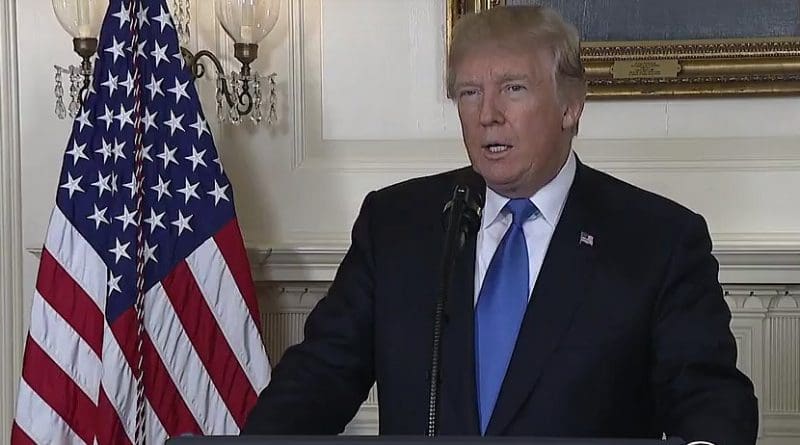Why Afghanistan Is Optimistic About New US Strategy – OpEd
By Arab News
By Ajmal Shams*
It has been three months since US President Donald Trump announced on Aug. 21 his administration’s official strategy for South Asia in general and for Afghanistan in particular. Afghan President Ashraf Ghani’s immediate response was one of optimism and support.
Ghani called the new US strategy “historic,” and said it showed the enduring US commitment to his country. But ordinary Afghans are yet to see the results in terms of its impact on security and economy.
As a result of Trump’s announcement, current troop levels have already increased to about 15,000 from the original 8,500. US Secretary of Defense Jim Mattis has made it clear that the size of the force will be as per military needs on the ground, not an arbitrary number. They are tasked to play both an advisory role and a counterinsurgency one. In addition, there are about 6,000 NATO troops, with the option of augmentation if required.
Trump’s vocal and frank declaration of his government’s stance has given new hope to the Afghan national unity government after months of ambiguity and confusion. He has exhibited political courage by negating his campaign promises of a complete pullout and disengagement. The realities on the ground must have caused Trump to change his mind. He has said a hasty withdrawal will create a vacuum that terrorists, including Daesh and Al-Qaeda, could instantly fill.
The main pillar of Trump’s strategy is a clear shift from a time-based approach to one based on conditions on the ground, which makes sense both from Afghan and American standpoints. Growing Russian influence and potential support to the Taliban is also one of the rationales behind renewed US military commitment and a political roadmap for Afghanistan.
The most significant point of Trump’s new strategy is a clear opinion on Pakistan’s role regarding its so-called war on terror. He said Pakistan provided safe havens to terrorists that target Americans and their allies in Afghanistan.
This is very important for the Afghan government, as unlike most previous US leaders, Trump’s message was loud and clear regarding Pakistan. But three months since the new strategy, the implications for Pakistan of this important development are yet to be seen.
What was also noteworthy in Trump’s speech was a major shift in the US approach toward Afghanistan. America would no longer be involved in nation-building.
Moreover, no effort will be made to Americanize Afghanistan. This is highly significant for Afghans.
Imported solutions for nation-building, and adapting Afghanistan to American values, have not been productive in the past. Such bold indications by the Trump administration have been welcomed, and show a more meaningful engagement with the Afghan government and people.
Trump wants a victorious outcome for US engagement in Afghanistan. That does not mean a never-ending war, but an honorable end through military and political means.
The US must elaborate on the mechanisms and arrangements it wants to put in place to ensure the intended victory, especially how it would like to deal with Pakistan. The political and economic pressures that are planned to be exerted on Pakistan to ensure its genuine cooperation in the war on terror have not been specified yet.
Trump has also called for an Indian role in Afghanistan’s stabilization efforts, especially its active contribution in economic development. Afghanistan, being a landlocked country, mostly relies on Pakistan for its transit trade. Trading with India via Pakistan has always been problematic.
With the opening of the strategic Chahbahar port through Iran and connecting with India, it is the beginning of the end of Afghanistan’s dependency on Pakistan. The arrival of the first Indian shipment to Afghanistan via Chahbahar is the start of a new chapter in Indo-Afghan trade relations, and is expected to further boost bilateral economic ties.
Trump’s new strategy for Afghanistan should not be interpreted as an excuse for more violence. The doors for a peaceful settlement are always open. A military solution has never been a viable option for our international partners and the Afghan leadership. Mattis has urged moderate members of the Taliban to join peace efforts, saying they could be part of the government if they renounce terrorism.
The commander of US forces in Afghanistan, Gen. John W. Nicholson Jr., believes that Afghan forces will go on the offensive against the Taliban in 2018 as part of a broader effort to force it to come to the negotiating table and end the conflict. “This is a fight-and-talk approach,” he said.
Afghans want peace and stability; they are tired of more than three decades of conflict and violence. There is renewed hope and optimism on the part of the Afghan government that the new US strategy will bring about a fundamental change in the rules of the game, forcing Pakistan to abandon its support to militant organizations and genuinely engage with Afghanistan for durable peace in the region.
* Ajmal Shams is president of the Afghanistan Social Democratic Party, and is based in Kabul. He is a deputy minister in the Afghan national unity government, and served as policy advisor to Dr. Ashraf Ghani when he chaired the security transition commission before his presidential bid. Twitter: @ajmshams

